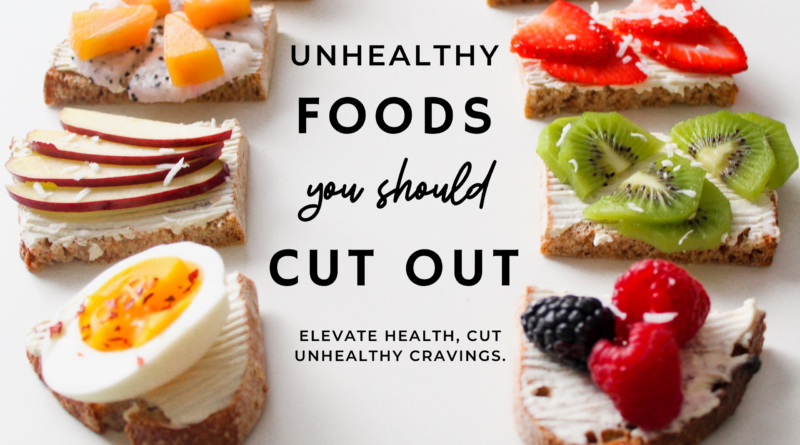Unhealthy Foods You Should Cut Out
In the bustling chaos of our daily lives, our food choices often take a back seat. Yet, the consequences of consuming unhealthy foods extend far beyond the immediate satisfaction of our taste buds. This article delves into the intricacies of unhealthy eating habits, providing insights into identification, risks, and the transformative power of embracing a healthier lifestyle.
Identifying Unhealthy Foods
The supermarket aisles beckon with colorful packaging and promises of convenience, but within lurk processed foods laden with hidden dangers. Processed foods, characterized by artificial additives and alarming levels of sugar and saturated fats, contribute significantly to the health issues plaguing modern society.
Health Risks Associated with Unhealthy Eating Habits
The repercussions of an unhealthy diet are profound, ranging from the visible impact of obesity to the silent assault on our cardiovascular system. Weight-related issues, an increased risk of heart diseases, and the subtle erosion of mental health underscore the urgency of reevaluating our dietary choices.
Common Unhealthy Foods to Avoid
Navigating the sea of unhealthy options requires awareness. From sugary beverages tempting our taste buds to highly processed snacks and the siren call of fast food and fried delights, these are the common culprits that sabotage our journey to wellness.
Benefits of Cutting Out Unhealthy Foods
As we bid adieu to unhealthy foods, the positive changes are both immediate and enduring. Experience a surge in energy levels, witness effective weight management, and revel in an enhanced sense of overall well-being that accompanies the decision to prioritize health.

Creating a Balanced Diet
The concept of a balanced diet is not a cryptic code but a simple equation involving the incorporation of a variety of nutrients. By embracing whole foods and approaching meal planning with mindfulness, individuals can unlock the door to sustained health and vitality.
Practical Tips for Transitioning to a Healthier Diet
Embarking on a journey towards a healthier diet need not be an arduous task. Opt for gradual changes, become adept at deciphering food labels, and consider seeking guidance from nutritionists or health professionals to ensure a smooth and sustainable transition.
The Psychological Aspect of Dietary Changes
The battle against unhealthy cravings and the establishment of healthy habits require a nuanced understanding of the psychological landscape. Learn to triumph over cravings, build habits that stand the test of time, and celebrate the small victories that pave the way to lasting change.
Impact of Unhealthy Foods on Children
Children, with their developing bodies and impressionable minds, are particularly vulnerable to the consequences of unhealthy eating habits. Parents and caregivers play a pivotal role in shaping healthy eating habits from an early age, establishing the groundwork for a lifetime of well-being.
Real-Life Success Stories
The power of transformation is exemplified through real-life stories of individuals who have successfully navigated the tumultuous waters of dietary change. These anecdotes serve as beacons of inspiration, highlighting the tangible and life-altering benefits that await those who embark on a journey towards healthier choices.
Connecting Diet and Physical Activity
In the intricate dance between diet and physical activity, each complements the other, creating a harmonious symphony of health. Regular exercise becomes a partner in the journey, enhancing overall well-being and reducing the risk of various health issues.

Navigating Social Situations and Peer Pressure
Social gatherings and peer pressure can pose formidable challenges to maintaining a healthy diet. Arm yourself with strategies for making wise choices in such situations and master the art of communicating dietary preferences without succumbing to awkwardness.
Long-Term Effects of a Healthy Diet
The journey towards a healthier lifestyle isn’t just a fleeting phase; it’s a lifelong commitment with profound long-term effects. By reducing the risk of chronic diseases, enhancing longevity, and cultivating sustainable habits, individuals pave the way for a future marked by vibrant health.
Seeking Professional Guidance
While general guidelines provide a compass, the true north lies in seeking professional guidance. Consult healthcare professionals for personalized advice, receive customized dietary plans based on individual needs, and embrace regular check-ins for monitoring progress and making necessary adjustments.
Conclusion
As we conclude this exploration into the realm of unhealthy foods, let’s reflect on the power each one of us holds to make positive changes. By embracing the wisdom shared here, you embark on a journey toward improved well-being. Remember, the first step is often the most transformative.
FAQs
Is it necessary to completely eliminate unhealthy foods, or can they be consumed in moderation?
Moderation is key. While complete elimination may not be realistic, reducing the intake of unhealthy foods is advisable.
How can parents encourage healthy eating habits in children?
Lead by example, involve children in meal preparation, and introduce a variety of nutritious foods from an early age.
What role does physical activity play in maintaining a healthy lifestyle?
Physical activity complements a healthy diet, contributing to overall well-being and reducing the risk of various health issues.
Are cheat days acceptable when trying to maintain a healthy diet?
Occasional indulgences are acceptable, but the key is to strike a balance and not let cheat days become a regular habit.
How can one overcome cravings for unhealthy foods?
Gradual reduction, finding healthier alternatives, and addressing emotional triggers can help overcome cravings.
READ: Natural Ways to Stop Dandruff


Pingback: Holiday Hack: Meduza Stealer 2.2 Debuts on Dark Web -
Pingback: 5 Benefits of Nutrition for a Healthy Lifestyle